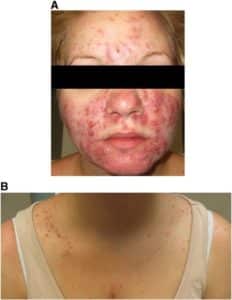Did you read the previous part about skin colour changes during pregnancy?
It’s funny, but many pregnant women say that their skin has never been so soft and smooth. On the other hand, some complain of widespread and unpleasant acne problems. Each woman is different, and each pregnancy is too.
Definition and Explaining Why:
Acne is a prevalent dermatological problem that is a combination of:
- Papules (red pimples)
- Pustules (whiteheads)
- Open and closed blackheads

There are many causes of acne, which includes the blockage of pores. This leads to an inflammation of the gland and skin hair. The secretion of sebum, a fatty substance, is associated with hormones. Sebum production is also a critical factor in the appearance of acne.
Sebaceous gland activity (skin glands) is generally increased during pregnancy. This is associated with physiological changes. These glands produce the small yellowish bumps found in the areola surrounding the nipples, called Montgomery tubercles. These special sebaceous glands use a natural oil to lubricate the nipple for breastfeeding.
Concerning sebaceous gland activity and its impact on acne during pregnancy, it can vary from one woman to another. Some women note an improvement in their acne, while others a deterioration, and even the spread of their acne. It really depends on the case.
Acne recommendations during pregnancy:
- Use a mild cleaner 1-2 times a day, for example, mild hydrating soap.
- Acne creams are considered safe given their low absorption risk. Even if major studies have shown that topical retinoids are safe, many dermatologists recommend terminating their use during pregnancy. Most other prescribed creams are fine during pregnancy (ex.: azelaic acid, topical antibiotics, benzoyl peroxide).
- Talk with your dermatologist about taking oral medication if necessary, as some acne outbreaks can and must be treated to diminish the risk of scarring. The medication used during pregnancy is an antibiotic.
- Accutane (isotretinoin) is not to be used during pregnancy. Ideally, stop the treatment at least one month before trying to become pregnant as Accutane can cause fetal malformations.
Ance recommendations after childbirth:
- Use a mild hydrating soap 1-2 times a day.
- All prescribed acne creams are fine with the breastfeeding period (ex.: retinoids, azelaic acid, topical antibiotics) except, once again, for Accutane.
- If you have severe acne outbreaks, talk with your dermatologist about oral medications to reduce the risk of scarring.
You can take certain antibiotics or hormones while breastfeeding, which can help with specific situations.
We will discuss tattoos in the next part.
Photo source: Management of severe acne during pregnancy: A case report and review of the literature)


